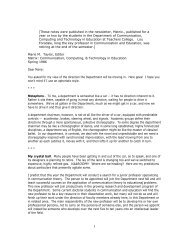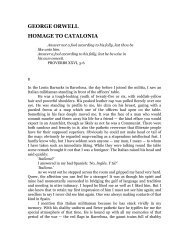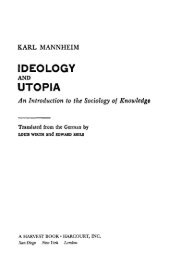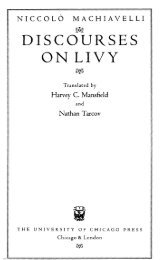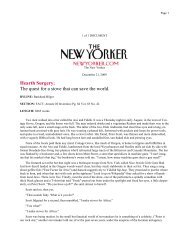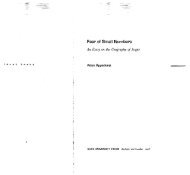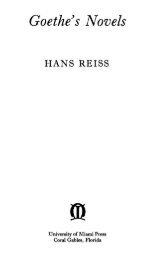THE REPUBLIC OF PLATO - Studyplace
THE REPUBLIC OF PLATO - Studyplace
THE REPUBLIC OF PLATO - Studyplace
You also want an ePaper? Increase the reach of your titles
YUMPU automatically turns print PDFs into web optimized ePapers that Google loves.
CHAPTER IV (I. 347 E-354 c)<br />
THRASYMACHUS: IS INJUSTICE MORE PR<strong>OF</strong>ITABLE THAN JUSTICE<br />
Socrates now turns from the art of government to T hrasymachul<br />
whole view of life: that injustice, unlimited self-seeking, pursued<br />
with enough force of character and skill to ensure success, brings<br />
welfare and happiness. This is what he ultimately means by the<br />
interest of the stronger.<br />
Socrates and Thrasymachus have a common ground for argument<br />
in that both accept the notion of an art of living, comparable to the<br />
special crafts in which trained intelligence creates some product.<br />
The goodness, excellence, or virtke of a workman lies in his efficiency,<br />
the Greek arete, a word which, with the corresponding<br />
adjective agathos, 'good,' never lost its wide application to whatever<br />
does its work or fulfils its function well, as a good knife is one that<br />
cuts efficiently. The workman's efficiency involves trained intelligence<br />
or skill, an old sense of the word sophia, which also means<br />
wisdom. None of these words necessarily bears any moral sense;<br />
but they can be applied to the art of living. Here the product to be<br />
aimed at is assumed to be a man's own happiness and well-being.<br />
The efficiency which makes him good at attaining this end is called<br />
'virtue'; the implied knowledge of the end and of the means to it is<br />
like the craftsman's skill and may be called 'wisdom: But as it<br />
sounds in English almost a contradiction to say that -to be unjust<br />
is to be virtuous or good and wise, the comparatively colourless<br />
phrase 'superior in character and intelligence' will be used instead.<br />
Where Socrates and Thrasymachus diDer is in their views of the<br />
nature of happiness or well-being. Thrasymachus thinks it consists<br />
in getting more than your fair share of what are commonly called<br />
the good things of life, pleasure, wealth, power. Thus virtue and<br />
wisdom mean to him efficiency and skill in achieving injustice.<br />
HOWEVER, I continued, we may return to that question later. Much<br />
more important is the position Thrasymachus is asserting now:<br />
3°



